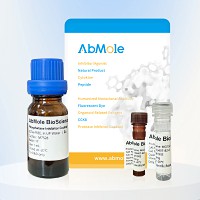
Recombinant Human KGF (FGF7) is a secreted protein mainly located in epithelial cells and belongs to the heparin binding growth factor family. FGF family members have a wide range of mitosis and cell survival activities and are involved in a variety of biological processes, including embryonic development, cell growth, morphogenesis, tissue repair, tumor growth and invasion. FGF7 is a powerful epithelial cell-specific growth factor with mitotic activity mainly in keratinocytes rather than fibroblasts and endothelial cells. This may be the main paracrine effect of normal epithelial cell proliferation.
Recombinant Human Fibroblast Growth Factor 7/Keratinocyte Growth Factor expressed the target gene encoding Cys32-Thr194.
Accession # : P21781
Expression system: E.coli
Endotoxin < 1 EU/ug
Lyophilized from a 0.2 μm filtered solution of 20mM Tris,1mM EDTA,5% Trehalose, 0.02% Tween 80, pH 8.0.
| Form | Lyophilized powder |
| Solubility (25°C) | Reconstitute the lyophilized powder in distilled water up to 100 μg/ml. |
| Storage | Stored at ≤ -20°C, stable for one year after receipt. Reconstituted protein solution can be stored at 2-8°C for 2-7 days and at -20°C for 3 months. |
| Species | Mouse | Rat | Rabbit | Guinea pig | Hamster | Dog |
| Weight (kg) | 0.02 | 0.15 | 1.8 | 0.4 | 0.08 | 10 |
| Body Surface Area (m2) | 0.007 | 0.025 | 0.15 | 0.05 | 0.02 | 0.5 |
| Km factor | 3 | 6 | 12 | 8 | 5 | 20 |
| Animal A (mg/kg) = Animal B (mg/kg) multiplied by | Animal B Km |
| Animal A Km |
For example, to modify the dose of Compound A used for a mouse (20 mg/kg) to a dose based on the BSA for a rat, multiply 20 mg/kg by the Km factor for a mouse and then divide by the Km factor for a rat. This calculation results in a rat equivalent dose for Compound A of 10 mg/kg.
| Related Recombinant Proteins Products |
|---|
| Recombinant Mouse Lumican (Mammalian, C-6His)
Lumican binds to laminin. It has positive regulation of transcription from RNA polymerase II promoter and transforming growth factor beta1 production. |
| Recombinant Human Serpin A12 (E.coli, N-GST)
Vaspin (Visceral Adipose-Specific SERPIN) is a newly described adipokine. Vaspin is also a unique insulin sensitizing adipocytokine in obesity. |
| Recombinant Human B2M Protein (Mammalian, C-6His)
β-2-Microglobulin (B2M) is a secreted protein with 1 Ig-like C1-type (immunoglobulin-like) domain which belongs to the beta-2-microglobulin family. B2M may adopt the fibrillar configuration of amyloid in certain pathologic states. |
| Recombinant Mouse E-Selectin/CD62E Protein (HEK293)
E-selectin, also known as endothelial leukocyte adhesion molecule-1 (ELAM-1) and CD62E, is an inducible adhesion molecule that is expressed on the surfaces of stimulated vascular endothelial cells and is sometimes involved in cancer cell metastasis. |
| Recombinant Human DPP4/CD26 (Mammalian, C-6His)
DPP4/CD26 is a signal-anchor for type II membrane protein that belongs to the peptidase S9B family. DPP4/CD26 acts as a positive regulator of T-cell coactivation, by binding at least ADA, CAV1, IGF2R, and PTPRC. It’s binding to CAV1 and CARD11 induces T-cell proliferation and NF-kappa-B activation in a T-cell receptor/CD3-dependent manner. |


Products are for research use only. Not for human use. We do not sell to patients.
© Copyright 2010-2023 AbMole BioScience. All Rights Reserved.
